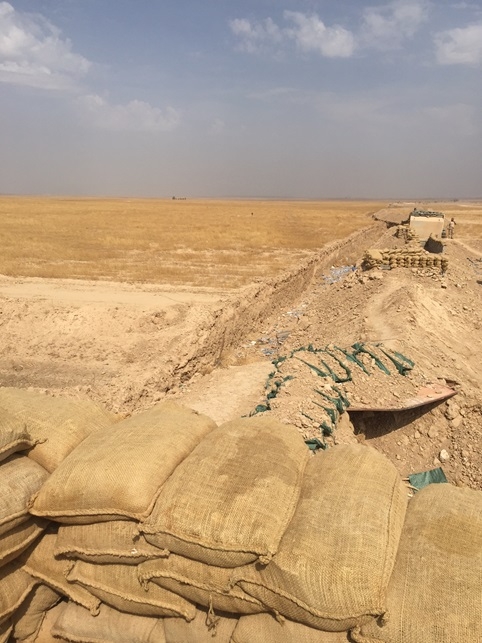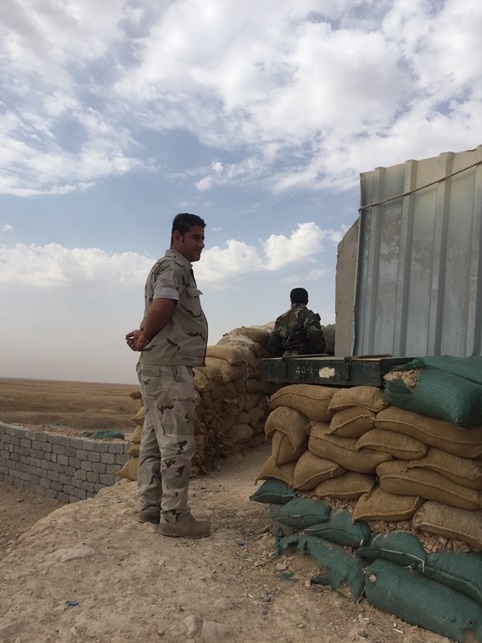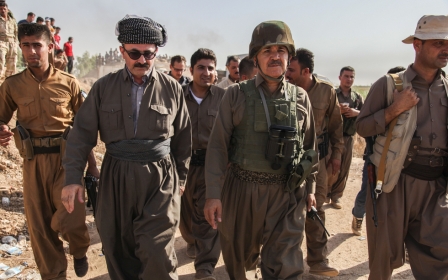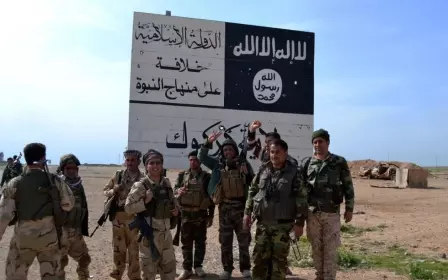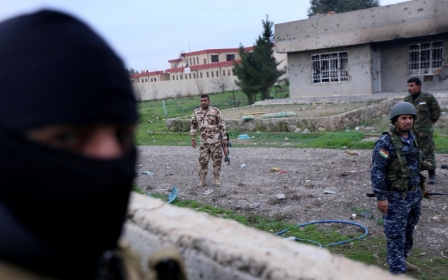Kurdish fighters say IS is retreating
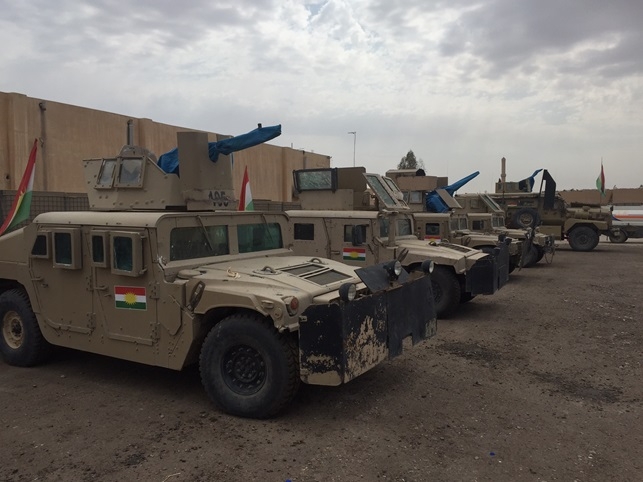
MAKHMOUR, Iraq - Lieutenant Haider Jawher takes his binoculars and looks through a small square gap in a wall of sandbags atop a tower of excavated earth. An outline of buildings in a village occupied by fighters for the Islamic State (IS) group can be seen five kilometers away.
There is no sign of movement, but when a Kurdish Peshmerga officer turns on his field radio and raises the volume, a voice speaking Arabic is heard saying "Abdullah, Abdullah." Jawher switches it off again, saying an IS fighter was calling a friend.
“It’s easy to listen to their talk, and we often do, but I don’t want them to hear our voices,” he says.
He was interrupted by the whine of aircraft belonging to the US-led coalition high above, too high and fast to be glimpsed.
“Our skies have become a road,” Jawher said with a grin. We are in a well-fortified outpost on the Kurdish frontline against IS, some 12km west of Makhmour. The tarmac road towards the IS-held village is blocked by a three-metre-high wall of earth, part of an embankment that stretches for dozens of kilometres north and south across the flat semi-desert.
In August 2014, IS fighters crossed a bridge over the river Tigris and raced down this road in vehicles, reaching as far as Makhmour, a largely Kurdish town of around 5,000 people. Almost everyone fled, but US airstrikes and the arrival of the Kurdish defence forces, the Peshmerga, drove IS out of town four days later.
The IS fighters retreated about five kilometres and set up a low bank of earth as a defence line. The Peshmerga overran it in December as they advanced to what became the new - and current - front line. Neither side has tried to advance since then, but they exchange occasional mortar fire. Jawher shows scraps of metal from a shell lying near his earthen tower.
Situated 50km southwest of Erbil, the capital of Iraqi Kurdistan, Makhmour lies in what used to be known as the disputed territories. The Kurds claim the territories as historic Kurdish lands but they are situated outside the official borders of the Kurdish Regional Government (KRG) and, until the IS attacks, were administered by the Iraqi government in Baghdad. The Peshmerga have taken control of almost all of them after driving IS out.
Given the poor state of relations between Baghdad and Erbil, it is hard to see the Iraqi government getting them back anytime soon.
In the name of defeating IS, the Peshmerga have even advanced beyond the boundaries of the disputed territories in some areas, especially in areas that contain Kurdish villages. Despite their military advances, the Peshmerga claim to be sensitive about alienating Arabs.
“We’ve liberated the Kurdish villages, but only a few Arab ones. We don’t want to go into Arab areas. We don’t to make problems with Arab communities,” Brigadier Zaryan Sheikh Wasany told Middle East Eye at his headquarters in Makhmour. “We are waiting for the Iraqi army to come but so far they have done nothing."
Five armoured Humvees stand in the yard outside his office, a relic of the Iraqi army’s flight in panic after IS stormed Mosul, Iraq’s second largest city last year. IS seized the US-supplied Humvees as well as scores of tanks from the Iraqi army. The Peshmerga have managed to recapture some of this hardware.
Kurdish civilians in Makhmour came back shortly after IS retreated. The religious fighters left little destruction in their wake, nor did they have much time to loot.
“Daesh [the Arabic acronym for IS] stayed three days in my house on the edge of town. They only killed one of my sheep to eat,” said Bajar Nameq, who runs a grocery shop in the dusty bazaar.
At the hospital Sabaha Mala Sayeed, a medical worker, said IS had taken computers and medicine but left the building otherwise intact.
While Makhmour’s front line remains quiet for now, Kurdish forces launched an offensive against IS some 30km to the east near Dibis on Wednesday morning. A Peshmerga commander told the Kurdish news agency, Rudaw, they had recaptured 12 villages, aided by airstrikes from the US-led coalition. IS fighters had abandoned them, but left booby traps and land mines behind.
The Peshmerga plan to take seven more villages in the area close to Kirkuk. No casualty figures for IS were available but a Peshmerga media officer told MEE that 11 Kurdish soldiers had died.
Peshmerga troops are being given weapons and training by several Western governments. But they have not received salaries for the last three months because of the KRG’s budget crisis. While Peshmerga morale was high during the initial assault to drive IS back last year, a Western diplomat said a lack of pay and the inaction brought about by the static nature of the front lines has eroded the troops' well-being.
“We have taken back 95 percent of the land which IS seized [in the Kurdish regions] and hopefully we will take the other five percent soon," Hemen Hawrami, the head of the Kurdish Democratic Party’s foreign relations office, told MEE. “The Peshmerga trenches are better protected. They have better weapons and ammunition. IS have lost the offensive. They’ve not seized a square kilometre of territory since August 2014. The Peshmerga have destroyed the myth of IS,” he said.
The key issue is whether the Iraqi army and the Peshmerga will go forward and attempt to liberate Mosul - a city now mainly inhabited by Arab Sunnis after most Kurds and Christians have fled since IS took over.
This spring, Iraqi Prime Minister Haider al-Abadi was trumpeting an advance on Mosul when autumn arrived, but Hawrami said he never expected it would happen in 2015.
“The Iraqi army isn’t ready. To liberate Mosul you have to have Sunnis. The Peshmerga won’t be the spearhead to liberate it. Sunnis have to be the spearhead,” he said.
He cited a series of problems. The Iraqi parliament had not yet passed a law setting up a national guard. Arab Sunnis did not know who would run Mosul once it was liberated. The Iraqi army has not yet been adequately trained.
Hawrami was referring to the national guard plan aimed at allowing Sunnis to set up local militias that can take action alongside the primarily Shia Iraqi army. As for Sunni worries about what happens if IS gets driven out, many of Mosul’s Sunnis felt the previous administration did not represent their interests. It remains to be seen if the Kurdish Peshmerga could get along with Mosul's local population.
New MEE newsletter: Jerusalem Dispatch
Sign up to get the latest insights and analysis on Israel-Palestine, alongside Turkey Unpacked and other MEE newsletters
Middle East Eye delivers independent and unrivalled coverage and analysis of the Middle East, North Africa and beyond. To learn more about republishing this content and the associated fees, please fill out this form. More about MEE can be found here.


